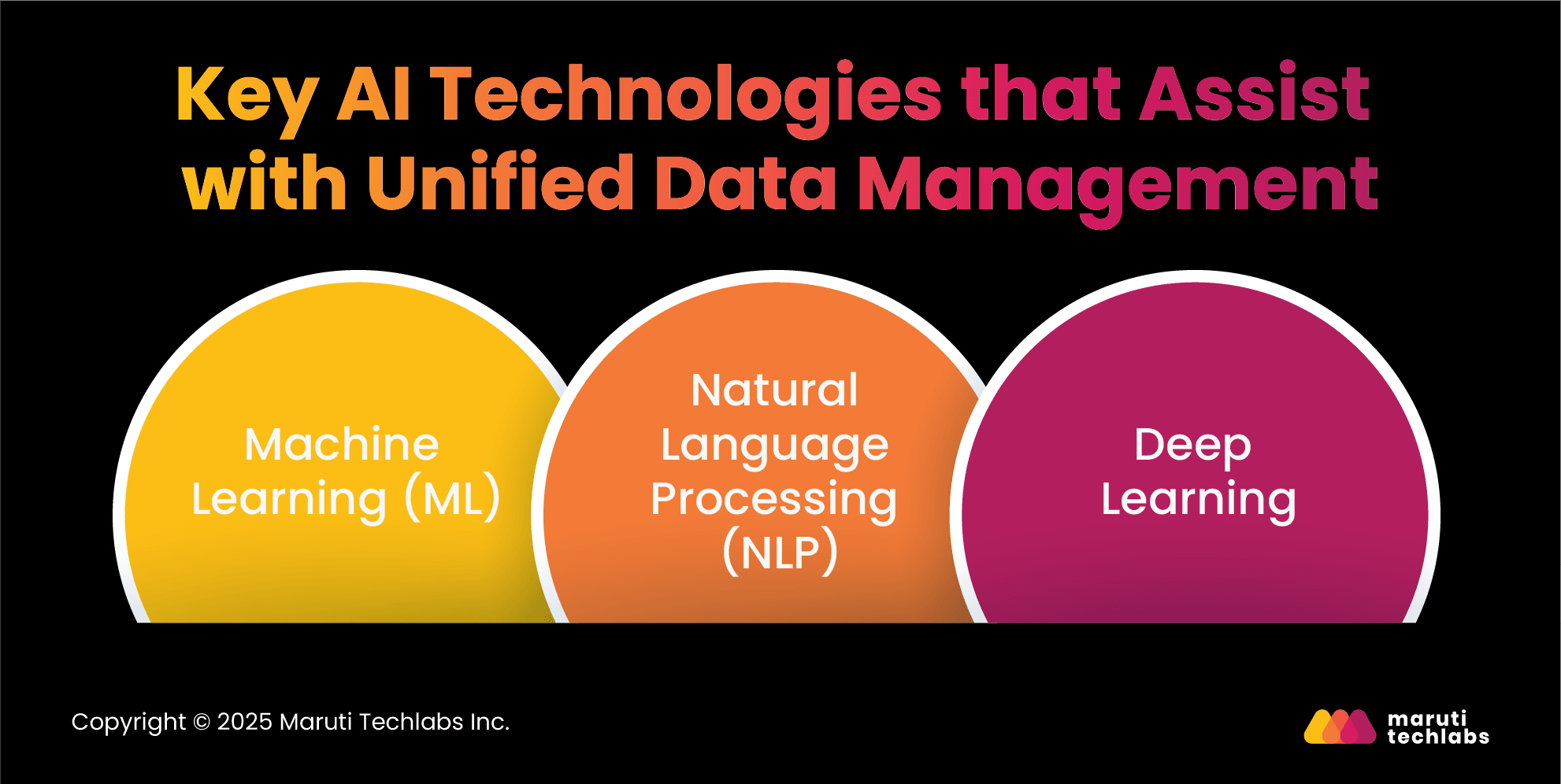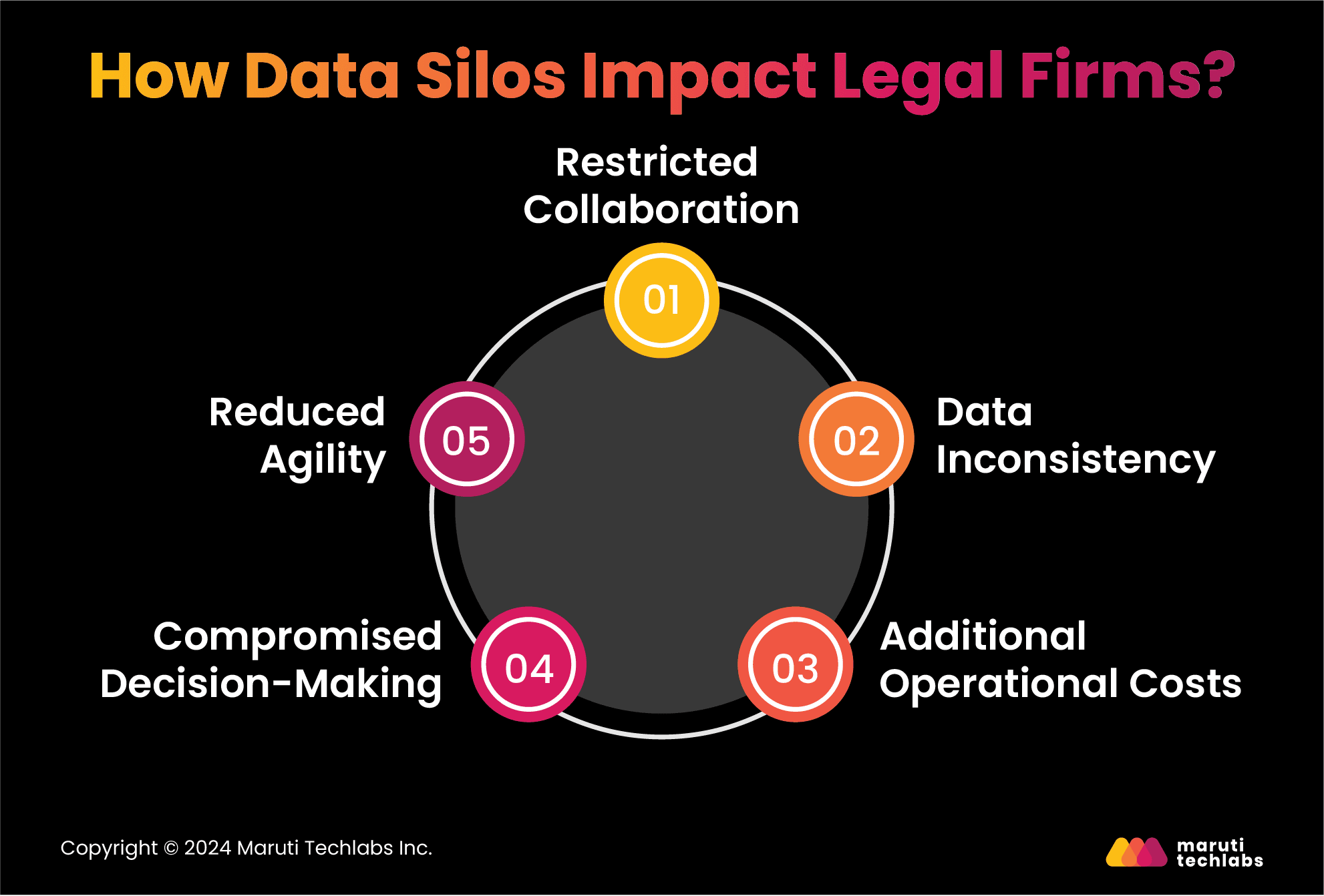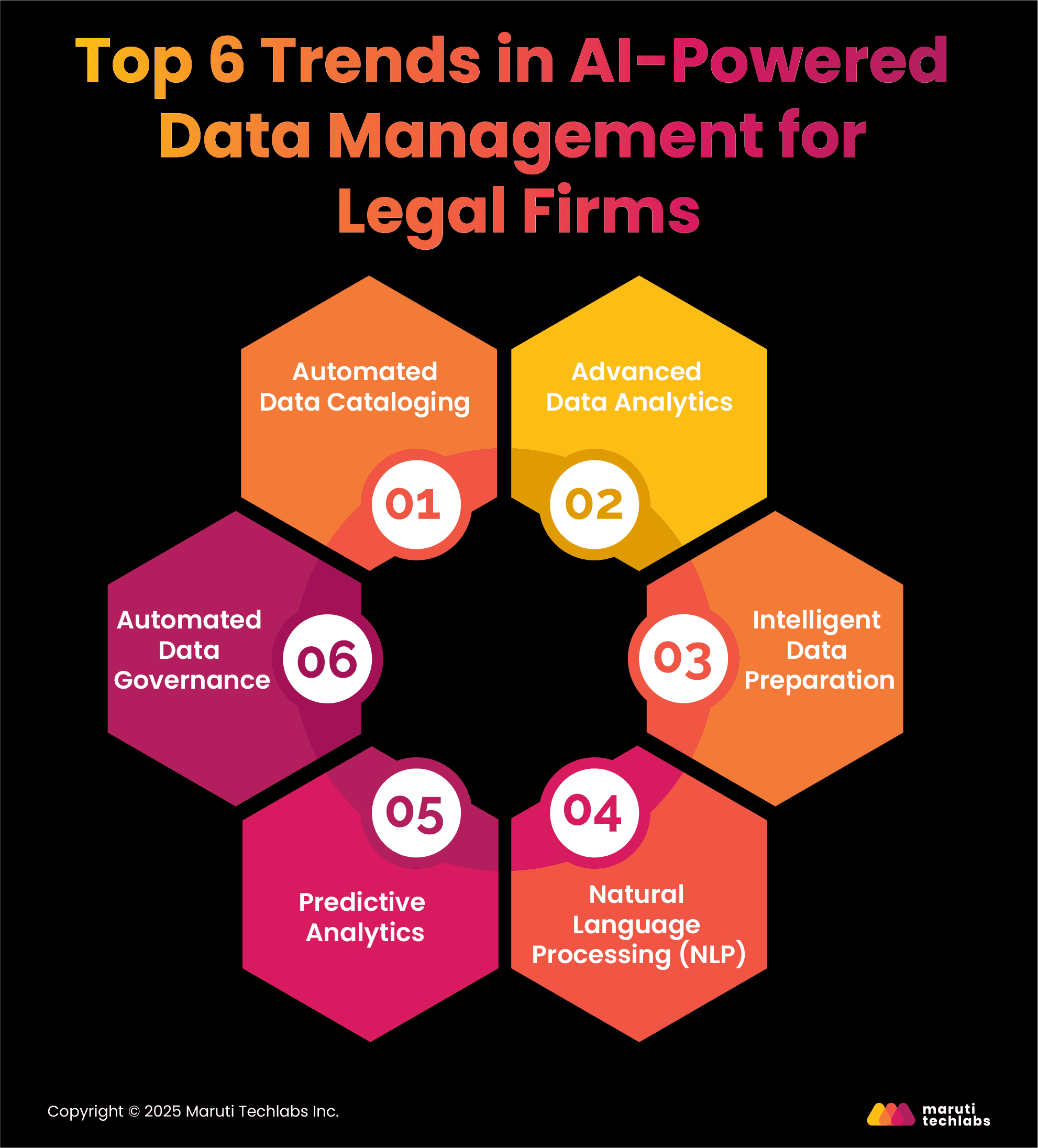

6 Powerful Ways AI Transforms Unified Data Management In Legal






Whether it's researching for a case, filing a lawsuit, or even learning rulings on similar cases in the past. Lawyers perform some of the most tedious tasks that demand working around crucial and verified data.
Data is the fuel required to power the day-to-day operations of any legal firm. However, many legal firms struggle with data scattered across different locations or devices. This problem with siloed data is a significant issue lawyers face without centralized data storage.
Artificial intelligence is the perfect aid for legal firms in data management. It unlocks a spectrum of new opportunities and insights that weren’t available before.
In this blog, we explore the impact of data silos on legal operations, key AI techs that lend a helping hand, and top trends in using AI for data management.
AI’s inclusion is changing all four facets of data management: accumulation, storage, assessment, and utility. It offers a coherent approach to managing high volumes of data.
Traditional manual data management methods include classifying, pattern recognition, and trend prediction. Today, AI tools introduce automation, deriving value from data significantly faster.
The primary aim behind data management is to enhance data quality. Stakeholders can only leverage data if it’s trustworthy or they’re prone to making adverse business decisions based on inaccurate data.
Manually testing data can cause mishaps, such as data inconsistency and duplication. AI’s proactive identification and correction eliminate these inequalities. These enhancements make data reliable and subsequently actionable.
Here are the three techs that make invaluable contributions to enhancing data management in the legal space.

Machine learning (ML) is elemental to AI-based data management. It decreases human intervention by allowing systems to learn from data and discover patterns.
Legal firms use ML to manage huge data volumes, aiding in trend prediction, anomaly detection, and automated data classification.
NLP fosters intuitive data management, equipping AI systems to comprehend and process human language.
NLP also offers assistance with tasks like data entry and categorization by extracting crucial insights from unstructured data from emails, documents, and social media posts.
A subset of ML, Deep Learning, analyzes complex data sets using neural networks. It works best for image recognition, speech processing, and large-scale data analytics. It offers acute assistance with data management and detailed insights that can be utilized for decision-making and strategy development.
From operations to strategic decisions, data silos can affect everything. While they may seem like isolated issues, it creates a domino effect, posing significant business issues. Here are a few consequences of data silos.
Data silos make collaboration difficult with restrictive data sharing. The lack of a unified data source may result in departments relying on incomplete or conflicting information.
Without data centralization, duplication and inconsistencies are unavoidable. Different teams maintain separate records for a client, resulting in misalignment and error reporting.

Isolated data systems can increase costs and inefficiencies. It also accounts for unanalyzed resource waste due to each department's investments in tools for managing siloed data.
A comprehensive view of legal operations is necessary to facilitate data-based decision-making. Data silos force teams to make uninformed decisions based on partial or outdated data.
Data silos put legal firms on the back foot by incapacitating them to evolve with market and customer demands.
Having a unified data management system might seem like commencing a technological revolution, but its actual benefit is implementing strategies and sound business management. The primary goal of this exercise is to make data-based, informative, and objective business decisions. It enhances operations and integration and ensures compliance and governance.
Unified data management assures continual business transformation and added benefits for the organization and staff. It helps legal firms better understand their business, answering important questions like how it operates currently and how it can be improved.
Data centralization also allows employees to access any necessary information anytime and anywhere. Structured data is easy to locate and accurate. As lawyers have to sift through hundreds of data files when preparing for a case, having a central repository can reduce the time it takes to find them. It also enhances data sharing across departments, fostering real-time collaboration between legal departments.
Cloud-based AI solutions offer integration with numerous BI tools, ensuring synchronicity. This accessibility eliminates concerns regarding data availability and dependency on a particular device or individual.
Centralized data storage enforces data security and policies that enhance data governance and security. It allows legal firms to protect sensitive information while ensuring data consistency, breaking down silos, and regulatory compliance.
Recent trends leverage AI for intelligent data preparation, advanced analytics, data cataloging, and more. Here are the top 6 trends that simplify new data challenges.
Data Cataloging is the process of having a complete inventory of the data possessed by an organization. Metadata holds information about the data, such as origin, type, description, and owner that maintains that particular form of data.
Cataloging is a time-intensive and cumbersome process prone to errors. AI works magic, facilitating automation in data cataloging by labeling and classifying data assets, easing the process of discovering data, and fixing errors and inconsistencies.
Even expert and experienced lawyers can miss simple data patterns in huge datasets. This is where techs like Machine Learning can be used to uncover hidden patterns or relationships. This can unlock more sophisticated insights assisting various legal departments. AI can also develop predictive models that offer accurate trend forecasting.
Data preparation and cleansing are crucial to accurate data analysis. AI assists with eliminating duplicate data, filling in missing values, and fixing inconsistencies. This accounts for refined data that is accurate and reliable for training AI models.

NLP equips AI models with the ability to grasp human language. If AI is trained to understand queries in human language, datasets can be more intuitively accessible. NLP is proficient with text summarization, discovering topics and themes, categorizing, and sentiment analysis.
At times, it’s difficult to understand what lies ahead, and it becomes too late when an organization sees it. AI is best known for using historical data to forecast future occurrences and find irregularities with current data. This helps legal firms mitigate risks before they manifest into reality. In addition, predictive analytics also helps improve operational effectiveness with data-driven decision-making.
Data governance and compliance powered by AI provide strong protection against breaches. AI tools help conduct essential activities such as audit logging, lineage tracking, and data access control. AI can encrypt sensitive data, pinpoint security risks, and add security layers to data if suspicious activity is identified.
AI is undoubtedly not here to replace lawyers but to empower them. AI-based technologies like machine learning, natural language processing, and deep learning enhance data management, offer predictive insights, and make data accessible.
Moreover, it equips legal professionals to focus on the most important thing - providing legal services and advice by removing hurdles of data silos. Legal firms who aim to embrace their data's full potential to devise future strategies must leverage AI.
We understand that using AI and garnering its best value requires expertise you might not have. Don't worry, we do!
We at Maruti Techlabs have nearly 15 years of experience incorporating AI-based technologies to improve data management for numerous industries. Leverage our Artificial Intelligence services to design tailored solutions that meet your business needs. Connect with us today to learn how quickly we can create an ever-accessible legal ecosystem.
Not sure where your firm stands in its AI journey? Start with our AI Readiness Assessment Tool to evaluate your current capabilities and identify the next steps toward effective AI adoption.
AI enhances data management by automating data entry, cleansing, and integration, ensuring accuracy and consistency. It enables predictive analytics, real-time insights, and anomaly detection. AI-powered tools improve decision-making, streamline workflows, and enhance security through advanced pattern recognition and automation.
Legally, DMS (Document Management System) refers to software used for storing, tracking, and managing legal documents securely. It ensures compliance, version control, and accessibility while streamlining workflows. Law firms and businesses use DMS for contract management, e-discovery, and regulatory compliance.
An example of document automation for legal firms is contract generation software, which auto-fills templates using client data. Tools like DocuSign CLM or HotDocs streamline drafting, approvals, and e-signatures, reducing errors, saving time, and ensuring compliance with legal standards.


